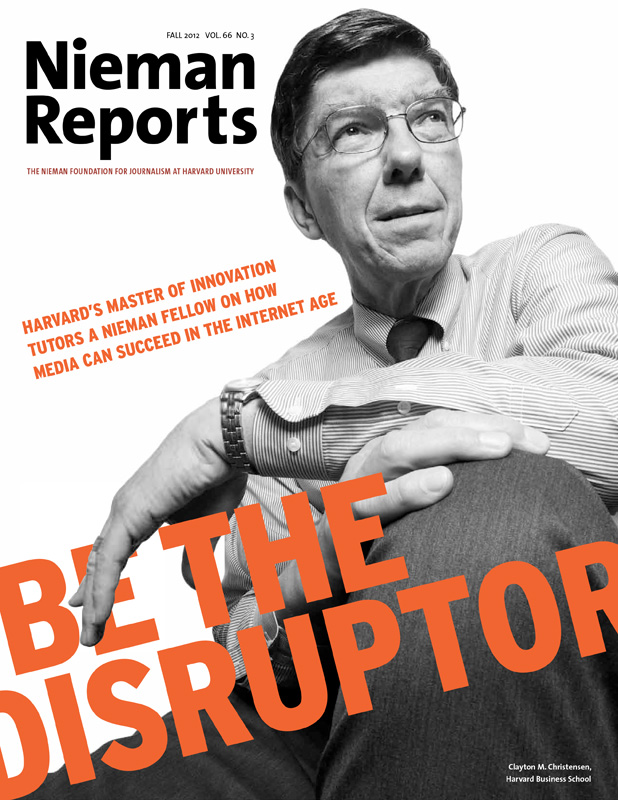
Be the Disruptor
Harvard Business School professor Clayton M. Christensen’s theory of disruptive innovation provides a framework to understand how businesses grow, become successful, and falter as nimble start-ups muscle in on their customers. It’s a familiar story, one that has played out in the steel and auto industries, among others. Now Christensen, in collaboration with 2012 Nieman Fellow David Skok, has applied his analysis to the news industry. Their goal in this issue's cover story, “Breaking News,” is to encourage news executives to apply the lessons of disruption to the media industry as a means of charting new paths to survival and success.
busine
David Skok found in his studies at Harvard Business School a new way to analyze what’s happening to the news business. Photo by John Soares.
I have never known a time when journalism was just journalism or the only profit margins journalists worried about were those belonging to the companies we reported on.
As a journalism intern at a sports news radio station in Toronto in 2002, I experienced my first taste of the business realities facing my craft. Just four weeks into my internship, the station's management, unable to compete in a saturated market, went off the air, leaving dozens of motivated, educated and talented journalists looking for work.
Months later when I was an intern at "ABC News Nightline," it faced cancellation amid rumors that David Letterman would take our late-night slot.
And finally, following the 2008 financial crisis, I watched as colleagues and mentors were laid off and news budgets were slashed after my newsroom's parent company, Canwest Global Communications Corp., declared bankruptcy.
Time and again, I have witnessed once mighty news institutions tackle revenue challenges with cost-cutting measures. These measures, in turn, have worsened the revenue challenges, putting us in a downward spiral that has sped up exponentially with the advent of new disruptive technologies and increased competition.
I'm not alone. For many of today's journalists, the idea of a church-and-state separation between the editorial and executive teams has always been an aspiration not matched by reality. We spend our days reporting the news and leading newsrooms while dreading the inevitable wave of cutbacks that is regularly just one staff meeting or quarterly earnings report away.
Across the industry, there are shock waves being felt as audiences and advertisers flock to new platforms. Media organizations have to adapt to a structural, systemic shift in their once healthy business models, and, once again, it is the journalists who are feeling the brunt of these changes.
It is frightening, but it is not terminal. There is still hope for traditional news organizations if we can make some courageous choices and recognize our own flaws. There has always been and will always be reporting so important to the functioning of society that no price tag can be placed on it. This fact makes it all the more urgent to meet today's revenue challenges.
During my 2011-2012 Nieman fellowship I had the great privilege of working with the widely recognized expert on strategy and innovation, Harvard Business School professor Clayton M. Christensen. His disciples include Intel's ex-CEO Andy Grove, New York City's Mayor Michael Bloomberg, and the late Apple CEO Steve Jobs who, according to Walter Isaacson's biography, was heavily influenced by Christensen's book "The Innovator's Dilemma: When New Technologies Cause Great Firms to Fail."
Having already tackled disruption in technology, education and health care, Christensen graciously obliged my request to help tackle disruption in journalism. Over a five-month period, Christensen, Forum for Growth and Innovation Fellow James Allworth, and I systematically applied his theories to journalism. The goal was to establish a framework for understanding what is taking place in the industry. While this won't provide immediate answers to the financial pressures facing incumbent news organizations, we hope it will provide a set of questions that news managers can ask as they make strategic decisions about their newsrooms.
Studying the news industry from a clinical perspective with my colleagues at the Harvard Business School and using the tools of analysis that have been applied to industries as diverse as manufacturing, technology and medicine has been a challenging but rewarding experience. Having been liberated from my own journalistic impulses and biases, I have come to the realization that while the technological disruptions facing our industry are 50 percent of the challenge; the other 50 percent is on us. We have failed to foster a newsroom culture that rewards innovation and empowers the younger generation, that can readily adapt to the new media world around us, and that is willing to experiment with the diversified revenue streams right in front of us. To use the oft-quoted phrase, "culture eats strategy for breakfast." Our traditional newsroom culture taken in aggregate has blinded us from moving beyond our walls of editorial independence to recognize that without sales and marketing, strategy, leadership and, first and foremost, revenues, there is no editorial independence left to root for.
In his 1958 address to the Radio and Television News Directors Association convention, Edward R. Murrow warned us not be "deluded into believing that the titular heads of the networks control what appears on their networks. They all have better taste. All are responsible to stockholders, and … are honorable men. But they must schedule what they can sell in the public market."
My own experience has confirmed that most executives are indeed honorable men and women, but I choose not to beg for their permission to create the journalism that we aspire to. I choose instead to meet them on their own turf by articulating a strategic vision for our shared sustainable future, because if we can't make the business case for journalism, nobody else will.
The culmination of our work is now available online and as a free download in e-book format. Whether you work for a successful mainstream newspaper, national broadcaster, city-sized daily, or an Internet news start-up, we hope that you will find our work gives you a new lens with which to view the dramatic changes taking place in journalism. Beyond that, our even greater hope is that it will help guide your newsroom with a clearer path forward as you position yourselves for journalism's bright future.
David Skok, the 2012 Martin Wise Goodman Canadian Nieman Fellow, is the managing editor of Globalnews.ca.

David Skok found in his studies at Harvard Business School a new way to analyze what’s happening to the news business. Photo by John Soares.
I have never known a time when journalism was just journalism or the only profit margins journalists worried about were those belonging to the companies we reported on.
As a journalism intern at a sports news radio station in Toronto in 2002, I experienced my first taste of the business realities facing my craft. Just four weeks into my internship, the station's management, unable to compete in a saturated market, went off the air, leaving dozens of motivated, educated and talented journalists looking for work.
Months later when I was an intern at "ABC News Nightline," it faced cancellation amid rumors that David Letterman would take our late-night slot.
And finally, following the 2008 financial crisis, I watched as colleagues and mentors were laid off and news budgets were slashed after my newsroom's parent company, Canwest Global Communications Corp., declared bankruptcy.
Time and again, I have witnessed once mighty news institutions tackle revenue challenges with cost-cutting measures. These measures, in turn, have worsened the revenue challenges, putting us in a downward spiral that has sped up exponentially with the advent of new disruptive technologies and increased competition.
I'm not alone. For many of today's journalists, the idea of a church-and-state separation between the editorial and executive teams has always been an aspiration not matched by reality. We spend our days reporting the news and leading newsrooms while dreading the inevitable wave of cutbacks that is regularly just one staff meeting or quarterly earnings report away.
Across the industry, there are shock waves being felt as audiences and advertisers flock to new platforms. Media organizations have to adapt to a structural, systemic shift in their once healthy business models, and, once again, it is the journalists who are feeling the brunt of these changes.
It is frightening, but it is not terminal. There is still hope for traditional news organizations if we can make some courageous choices and recognize our own flaws. There has always been and will always be reporting so important to the functioning of society that no price tag can be placed on it. This fact makes it all the more urgent to meet today's revenue challenges.
During my 2011-2012 Nieman fellowship I had the great privilege of working with the widely recognized expert on strategy and innovation, Harvard Business School professor Clayton M. Christensen. His disciples include Intel's ex-CEO Andy Grove, New York City's Mayor Michael Bloomberg, and the late Apple CEO Steve Jobs who, according to Walter Isaacson's biography, was heavily influenced by Christensen's book "The Innovator's Dilemma: When New Technologies Cause Great Firms to Fail."
Having already tackled disruption in technology, education and health care, Christensen graciously obliged my request to help tackle disruption in journalism. Over a five-month period, Christensen, Forum for Growth and Innovation Fellow James Allworth, and I systematically applied his theories to journalism. The goal was to establish a framework for understanding what is taking place in the industry. While this won't provide immediate answers to the financial pressures facing incumbent news organizations, we hope it will provide a set of questions that news managers can ask as they make strategic decisions about their newsrooms.
Studying the news industry from a clinical perspective with my colleagues at the Harvard Business School and using the tools of analysis that have been applied to industries as diverse as manufacturing, technology and medicine has been a challenging but rewarding experience. Having been liberated from my own journalistic impulses and biases, I have come to the realization that while the technological disruptions facing our industry are 50 percent of the challenge; the other 50 percent is on us. We have failed to foster a newsroom culture that rewards innovation and empowers the younger generation, that can readily adapt to the new media world around us, and that is willing to experiment with the diversified revenue streams right in front of us. To use the oft-quoted phrase, "culture eats strategy for breakfast." Our traditional newsroom culture taken in aggregate has blinded us from moving beyond our walls of editorial independence to recognize that without sales and marketing, strategy, leadership and, first and foremost, revenues, there is no editorial independence left to root for.
In his 1958 address to the Radio and Television News Directors Association convention, Edward R. Murrow warned us not be "deluded into believing that the titular heads of the networks control what appears on their networks. They all have better taste. All are responsible to stockholders, and … are honorable men. But they must schedule what they can sell in the public market."
My own experience has confirmed that most executives are indeed honorable men and women, but I choose not to beg for their permission to create the journalism that we aspire to. I choose instead to meet them on their own turf by articulating a strategic vision for our shared sustainable future, because if we can't make the business case for journalism, nobody else will.
The culmination of our work is now available online and as a free download in e-book format. Whether you work for a successful mainstream newspaper, national broadcaster, city-sized daily, or an Internet news start-up, we hope that you will find our work gives you a new lens with which to view the dramatic changes taking place in journalism. Beyond that, our even greater hope is that it will help guide your newsroom with a clearer path forward as you position yourselves for journalism's bright future.
David Skok, the 2012 Martin Wise Goodman Canadian Nieman Fellow, is the managing editor of Globalnews.ca.


